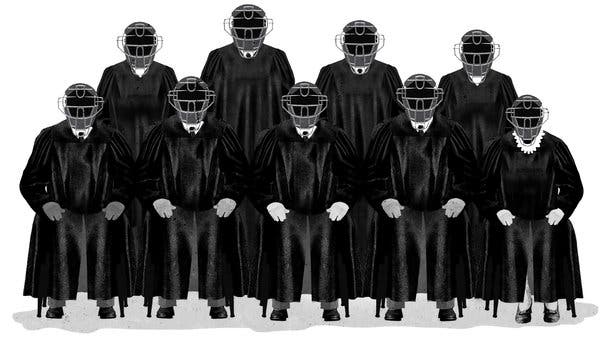Having served its purpose, Originalism is taken out and unceremoniously shot

Some readers have requested a thread on Adrian Veremule’s Atlantic essay on what he calls “common-good constitutionalism:
[O]riginalism has now outlived its utility, and has become an obstacle to the development of a robust, substantively conservative approach to constitutional law and interpretation. Such an approach—one might call it “common-good constitutionalism”—should be based on the principles that government helps direct persons, associations, and society generally toward the common good, and that strong rule in the interest of attaining the common good is entirely legitimate. In this time of global pandemic, the need for such an approach is all the greater, as it has become clear that a just governing order must have ample power to cope with large-scale crises of public health and well-being—reading “health” in many senses, not only literal and physical but also metaphorical and social.
Vermeule is a recent convert to the most reactionary form of Catholicism, so what he means by “the common good” is the imposition of a reactionary Catholic regime. Such a regime would, as Vermeule makes clear, be explicitly authoritarian and hierarchical, in the United States and (eventually) around the world:
As the superb blog Semiduplex observes, Catholics need to rethink the nation-state. We have come a long way, but we still have far to go — towards the eventual formation of the Empire of Our Lady of Guadalupe, and ultimately the world government required by natural law.
I myself have no objection to Our Lady of Guadalupe per se, who indeed appears to me quite regularly on the back windows of pickup trucks here in Colorado, but I’m not a fan of reactionary Catholic politics, that as many people have observed tend to be at least fascist-adjacent, if not fascist simpliciter.
My thoughts on Vermeule are here, and I’m not going to repeat them.
A couple of related points:
(1) Over the past several decades, originalism in American legal thought has almost always been defended on descriptive/formal rather than normative/political terms. In other words, originalists almost always claimed that originalist interpretation was simply required by the rules of the legal game, not because it gave you desirable results from a consequentialist perspective. (John Roberts’s “balls and strikes” comments during his confirmation hearings was the clearest statement of this position in non-technical terms.) So it’s striking to see Vermeule simply dumping the entire edifice of originalist argument, for a justification that is on its face the clearest possible version of the view that judges and other legal actors should self-consciously create the law rather than merely interpret it, when manipulating the legal texts available to them. (The claim that “judges should interpret the law rather than legislate from the bench” has been the cornerstone of Federalist Society dogma since that organization’s inception).
(2) It would be a mistake, in my view, to condemn Vermeule’s argument on primarily formalistic rather than explicitly political grounds. Vermeule is at were a defender of what in the bad old days was known as critical legal studies, except his ideological priors are from the extreme right rather than the left. The cls critique of legal formalism was, however, largely correct. Vermeule has bad politics rather than bad jurisprudence, and he and ilk should be opposed on that basis, not because he’s attacking “the rule of law” per se. He isn’t: his view of what the rule of law should be is an explicitly political one — but all such views are political by nature. A liberal democratic reading of the Constitution is no less “political” than Catholic theocratic one, and claiming that a “correct” interpretation of that document supports one view rather than the other is ultimately a form question begging.
More to the point, as the printing of this article in the Atlantic illustrates, the fascists and their enablers are not coming — they’re very much already here, and we need to respond appropriately.


